
SAIL DRAFT
Sail draft (chord depth) is an imaginary line from luff to leech called the chord. Chord depth can then be expressed as the ratio percentage between the maximum draft (d) and chord length (c). Draft stripes or seams in the sail can be used to estimate the depth. It is quite difficult to measure, so cruising sailors will use their eyes and experience to estimate draft.
DRAFT POSITION
The distance from the luff to where you find the maximum draft in the sail is called the draft position. Draft forward gives a lower lift/drag ratio, and you can’t point as high as with the draft aft. But it is a more forgiving shape, making it easier to steer and giving a wider ‘groove’. The ‘groove’ is a narrow course range determined by a combination of your sail trim, boat speed and pointing ability. Once ‘in the groove’ your boat comes alive and travels at maximum efficiency. Draft forward is therefore more suitable in rougher conditions or for a less experienced helmsman.
Draft aft gives a better lift/drag ratio than draft forward, allowing you to point higher. The sail will, though, stall more easily if the boat is not steered correctly. Draft aft sail shape is therefore best in easier conditions (medium winds and flat seas).
This story is from the April 2024 edition of Yachting Monthly UK.
Start your 7-day Magzter GOLD free trial to access thousands of curated premium stories, and 9,000+ magazines and newspapers.
Already a subscriber ? Sign In
This story is from the April 2024 edition of Yachting Monthly UK.
Start your 7-day Magzter GOLD free trial to access thousands of curated premium stories, and 9,000+ magazines and newspapers.
Already a subscriber? Sign In

Midsummer on Hanö
This wonderful little island in the south-east of Sweden is a real gem off the beaten track
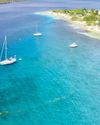
ADVENTURE SAILING TO HAITI
After spending two months in the Dominican Republic, Andy Brown sails west to Haïti bringing medical and school supplies to the town of Mole Saint Nicholas
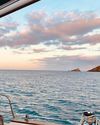
In celebration of bad sailing
New owner Monty Halls tests his sailing skills with his family aboard their Colvic 34 ketch, Sobek. A recently qualified Day Skipper, Monty faces a few unexpected challenges...

Winter brings excitement and opportunity
Oddity’s double glazing, insulation and heating create a warm, homely environment as I bash out this column.
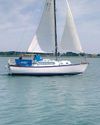
ADVENTURE MAISIE GOES TO GOES
To depart or not to depart? That is the question. Is it safer to stay, or suffer the wind and weather of a rough North Sea?

'MAYDAY, GRANDAD OVERBOARD!'
When David Richards and his grandson Henry went out racing from lowey, they didn't expect their sail to end with a lifeboat rescue
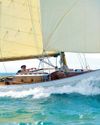
VERTUE
For a 25-footer, the Vertue has a huge reputation and has conquered every ocean. So what makes this little boat quite such an enduring success? Nic Compton finds out
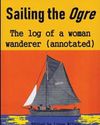
Sailing siblings
Mabel Stock, her brother Ralph, a friend Steve and an unnamed paying passenger passed through the Panama Canal in December 1919 on the sturdy Norwegian cutter Ogre. They were towed to a quiet anchorage in Balboa away from the boat traffic but within rowing distance of the shore.
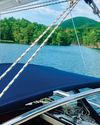
TECHNICAL MAINSAIL MODIFICATIONS
Safety and performance improved hugely when Mike Reynolds reduced the size of his mainsail and re-configured the systems controlling it
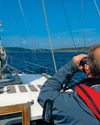
PILOTAGE DONE PROPERLY
Chartplotters are an amazing aid, but can detract from your real-world pilotage if not used with caution, says Justin Morton